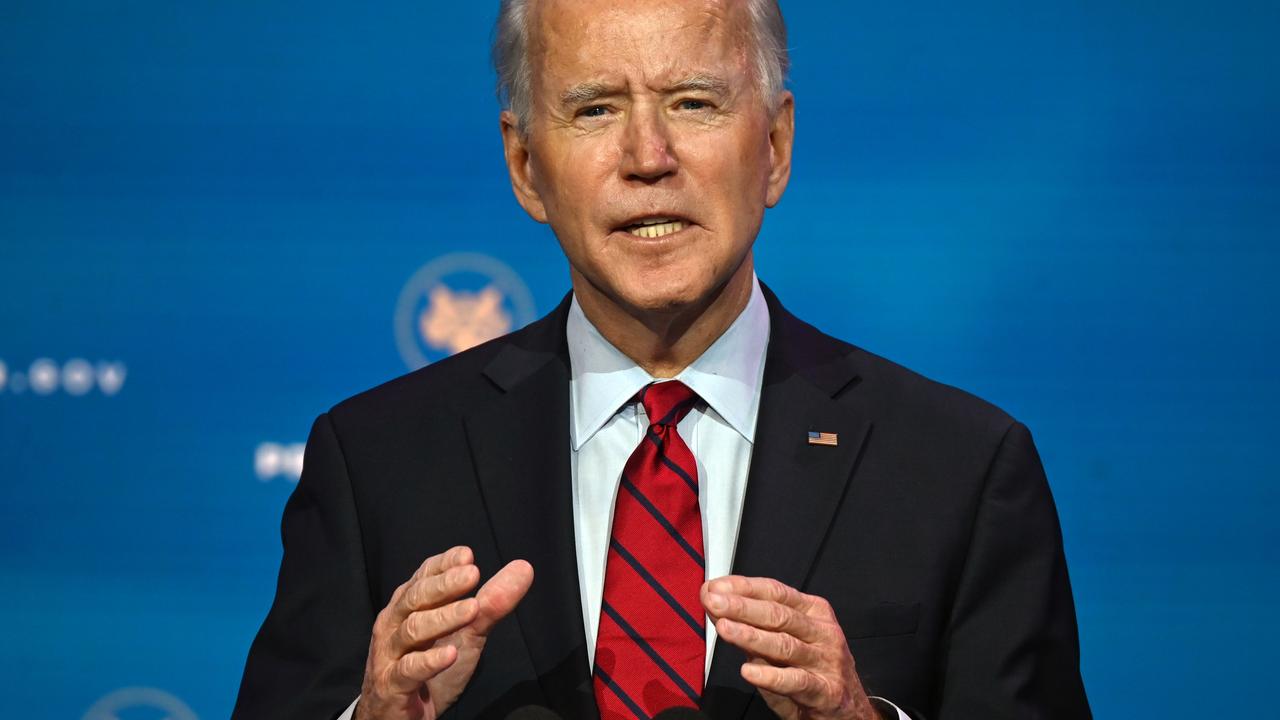Joe Biden’s nomination of General Lloyd Austin for US secretary of defence sparks concerns
Joe Biden has made his most controversial choice since becoming America’s president-elect, sparking opposition from within his own party.

Joe Biden’s pick to serve as his defence secretary has caused a backlash within the president-elect’s own party, and revived a previously dormant debate about the relationship between America’s military and its civilian government.
Earlier this week, Mr Biden chose to give the job to General Lloyd J. Austin III, a retired four-star Army general and the only African-American in history to have headed US Central Command.
It’s an accomplished resume, no doubt, but a problematic one as well.
Usually, a military officer must be retired from active service for at least seven years before they can become defence secretary. As Gen Austin retired in 2016, he will need a waiver from Congress exempting him from that requirement.
He might not get one.
RELATED: Drama inside Joe Biden’s transition team

Like most liberal democracies, the United States has a long tradition of preserving civilian control over the military.
That principle was written into the country’s Constitution back in the late 1700s, with the president – a civilian elected by the people – being made commander-in-chief of the US Army and Navy.
Meanwhile, Congress was given the power to fund the military and to declare war.
The National Security Act, passed in 1947, further enshrined the tradition by specifying that only a civilian could lead the Defence Department. This is when the requirement that a former officer must have been retired for seven years became official.
The issue came back into focus at the start of 2017, when president-elect Donald Trump nominated James Mattis, a retired four-star Marine general, to be his first secretary of defence.
Like Gen Austin, Gen Mattis had not been retired from active service for the required period, and needed a waiver.
In a report to Congress, written in response to Gen Mattis’ nomination, security analyst Kathleen McInnes described civilian control of the military as a “fundamental tenet underpinning the design and operation of the American republic”.
Nevertheless, senators from both major parties overwhelmingly supported the nomination. Gen Mattis was widely respected on both sides of politics, and the Democrats in particular hoped he would have a stabilising influence on Mr Trump.
Gen Mattis got his waiver. But some Democratic senators specifically said they would not make the same exception again in the future.
“I will not support a waiver for future nominees,” said Senator Jack Reed, the ranking Democrat on the Armed Services Committee, for example.
Now, following Mr Biden’s nomination of Gen Austin, a couple of senators have already said they will not vote to grant him a waiver.
“I have great respect for Gen Austin. His career has been exemplary, and I look forward to meeting him and talking to him more. But I opposed a waiver for Gen Mattis, and I will oppose a waiver for Gen Austin,” Senator Elizabeth Warren said.
“This nomination is exciting and historic. But I believe that a waiver of the seven-year rule would contravene the basic principle that there should be civilian control over a non-political military,” said Senator Richard Blumenthal.
“I will not support the waiver.”
“I didn’t for Mattis, and I don’t think I will for him,” said Senator Jon Tester.
And Senator Tammy Duckworth, a military veteran who was reportedly on Mr Biden’s shortlist of candidates for vice president, called the idea of granting a second waiver in two administrations a “dangerous precedent”.
“It is important in our system of government that there is civilian oversight, civilian leadership over the military,” Ms Duckworth said.
“And what has happened with these waivers is that we’re slowly shifting towards a point where you could actually have military officers leave active duty and go on to become defence secretaries. That’s not appropriate.”
Mr Reed, for his part, is staying on the fence for now. He has said his “preference” is for “someone who is not recently retired”.

That might not seem like much opposition – at most, there are just five “no” votes from the senators mentioned above, and some of them might end up supporting Gen Austin anyway.
But the balance of power in the Senate is such that, if the Republican Party decides to oppose the nomination en masse, any defections from the Democrats could be decisive.
There are currently 50 confirmed Republican senators and 48 Democrats. Should the Democrats win both upcoming special elections in Georgia – something I would suggest is a longshot – that will result in a chamber split 50-50.
Mr Biden clearly knows how precarious the situation could become. Yesterday he published an opinion piece in The Atlantic, in which he made his case for picking Gen Austin and tried to reassure wavering Democrats.
“The fact is, Austin’s many strengths and his intimate knowledge of the Department of Defence and our government are uniquely matched to the challenges and crises we face. He is the person we need in this moment,” Mr Biden wrote.
“I respect and believe in the importance of civilian control of our military and the importance of a strong civil-military working relationship at Defence. As does Austin.
“We need empowered civilians working with military leaders to shape Defence’s policies and ensure that our defence policies are accountable to the American people.
“Austin also knows that the secretary of defence has a different set of responsibilities than a general officer, and that the civil-military dynamic has been under great stress these past four years. He will work tirelessly to get it back on track.”
Mr Biden once again tried to justify his choice as he officially introduced Gen Austin as his nominee in front of the cameras in Wilmington, Delaware today.
“I know this man. I know his respect for our Constitution. I know his respect for our system of government,” the president-elect said.
“I have personally worked with this man. I have seen him lead American fighting forces on the field of battle. I have also watched him faithfully carry out the orders of the civilian military leadership of this nation.
“So, just as they did for Secretary Jim Mattis, I ask the Congress to grant a waiver for Lloyd Austin.”
Gen Austin also spoke at the event. He promised he would keep the Defence Department “grounded in meaningful civilian oversight”.
“I come to this new role as a civilian leader – with military experience to be sure – but also with a deep appreciation and reverence for the prevailing wisdom of civilian control of our military,” he said.

Gen Austin’s nomination has also been met with scepticism from the news media.
For example, today MSNBC host Katy Tur spent several minutes debating former Democratic senator Claire McCaskill, who supports granting a waiver.
“Tell me why your support supersedes the concerns that several senators have,” Tur asked.
“I think this is going to be a pretty simple calculation for most members of Congress,” Ms McCaskill replied.
“If you were against the Mattis waiver, because you feel so strongly about a certain period of time passing after someone retires, then you have the right to be against Gen Austin.
“If, on the other hand, you voted for the waiver for Mattis, then I think a very compelling case can be made that there are just as compelling reasons for this man to get the waiver as Mattis getting the waiver.
“There were only 17 no votes in the Senate when we confirmed Gen Mattis. I have a feeling there may be a few Republicans who are going to be political, who will do this, but you’d have to have a lot of people change their votes to deny him a confirmation. I don’t think that’s going to happen.”
“Claire, the reason why so many people voted for Mattis though, part of the reason, the calculation, was that Donald Trump was so untested, so erratic, you needed adults in the room,” Tur countered.
“And Jim Mattis was well respected. He was also seen as better than some of the other picks that might come out. So there were people that made the calculation to say, ‘I’ll sign this waiver, for this candidate, for this president.’
“Does it still factor in to what Biden is doing here? Biden is not Donald Trump, he’s not as erratic. Are there not other people that Biden could nominate that could do as good a job, that would be a civilian?”
Ms McCaskill said she had voted for Gen Mattis’ waiver because she knew him and thought he would do a good job, rather than for the reason Tur had outlined.
“Many of the senators know Gen Austin just as well,” she argued.
“This is a moment in our history where this president (elect) has said, ‘My Cabinet needs to look like America.’
“Over 40 per cent of our military are people of colour. It is time, and I think it makes it very difficult for people to vote against the nominee.”

Another of Tur’s guests, General Barry McCaffrey, backed Ms McCaskill up, calling Gen Austin “one of the best people in national security”.
“I understand he is uniquely qualified. I understand that he is a historic pick. I understand all the points for him,” Tur said.
“But there are still people out there who are uncomfortable with the slippery slope that we’re facing right now. Two administrations in a row, two waivers. Does that mean we’re going to get rid of civilian control?
“Is that going to be a thing of the past, if the person is trusted by senators and has unique qualifications?”
Ms McCaskill argued there would “always be a dividing line” between the military and the government, and said Americans could trust Gen Austin to “be very vigilant” about preserving it.




